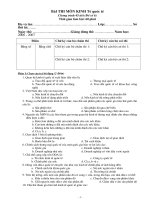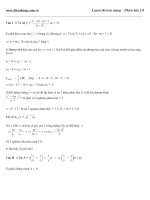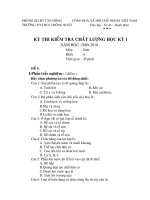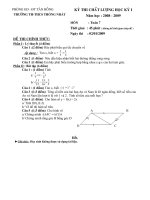Đề thi môn: ASSIGNMENT - 6 ppsx
Bạn đang xem bản rút gọn của tài liệu. Xem và tải ngay bản đầy đủ của tài liệu tại đây (321.12 KB, 2 trang )
1
Thuan Xuan Nguyen
Department of Electronics and Telecommunications
University of Science, Ho Chi Minh City
Vietnam National University, Ho Chi Minh City
Tel: (+84) 906 834 817
Email:
Site:
ASSIGNMENT #6
Edited: Wednesday, May 18
th
2011
Question 1, 6: use Vietnamese only
1. Based on Section 7.9 (page 497/1003), express the differences in sequencing methodologies
between Pentium 4 and Itanium 2.
2. Consider the path in the following figure using flip-flops F1, F2, and F3. The flip-flops have a
setup time of 100 ps and a clock-to-Q delay of 150 ps. There is no skew between the clocks
Φ1a, Φ1b, Φ1c that all share the same start time. The departure time from each flop is D1 =
D2 = D3 = 0.
o What is the minimum cycle
time at which the system
operates correctly?
o Suppose that Φ1a and Φ1b are
in a common local clock
domain, but Φ1c is in a
different clock domain. What
is the minimum cycle time of
the system if
o The local skew is 50 ps and
the global skew is 140 ps?
o The local skew is 25 ps and
the global skew is 300 ps?
3. For the path in Figure 3.1, determine which latches borrow time and if any setup time
violations occur. Repeat for cycle times of 1200 and 800 ps. Assume there is zero clock skew
and that the latch delays are accounted for in the propagation delay ∆’s.
o ∆1 = 550 ps; ∆2 = 580 ps; ∆3 = 450 ps; ∆4 = 200 ps
o ∆1 = 300 ps; ∆2 = 600 ps; ∆3 = 400 ps; ∆4 = 550 ps
2
Figure 3.1
4. Determine the minimum clock period at which the circuit in Figure 4.1 will operate correctly
for each of the following logic delays. Assume there is zero clock skew and that the latch
delays are accounted for in the propagation delay ∆’s.
o ∆1 = 300 ps; ∆2 = 400 ps; ∆3 = 200 ps; ∆4 = 350 ps
o ∆1 = 300 ps; ∆2 = 900 ps; ∆3 = 200 ps; ∆4 = 350 ps
Figure 4.1
5. A synchronizer users a flip-flop with T
s
= 54 ps and T
0
= 21 ps. Assuming the input toggles at
10 MHz and the setup time is negligible, what is the minimum clock period for which the
mean time between failures exceeds 100 years?
6. Inferior Circuits, Inc., wants to sell you a perfect synchronizer that they claim never produces
a metastable output. The synchronizer consists of a regular flip-flop followed by a high-gain
comparator that produces a high output for inputs above 0.25V
DD
and a low output for inputs
below that point. The VP of marketing argues that even if the flip-flop enters metastability, its
output will hover near V
DD
/2 so the synchronizer will produce a good high output after the
comparator. Why wouldn’t you buy this synchronizer?









